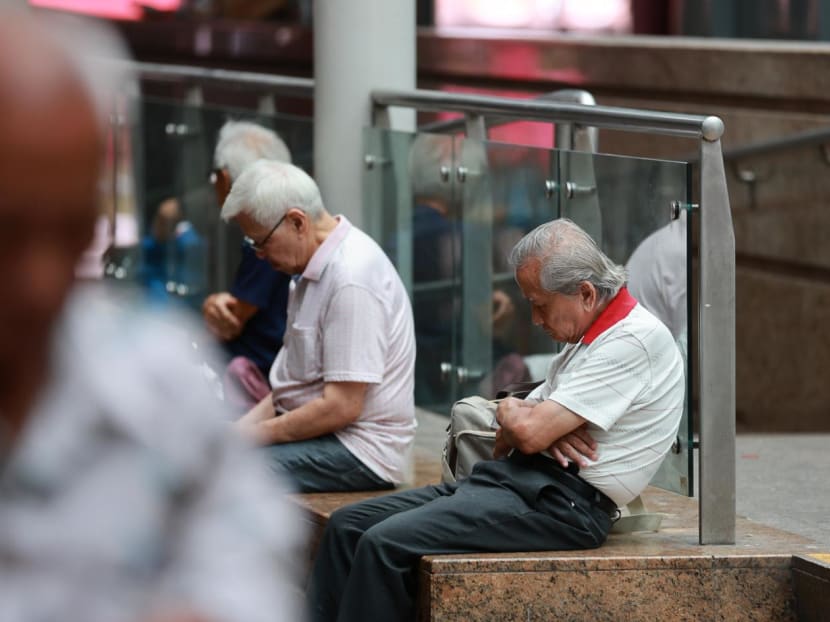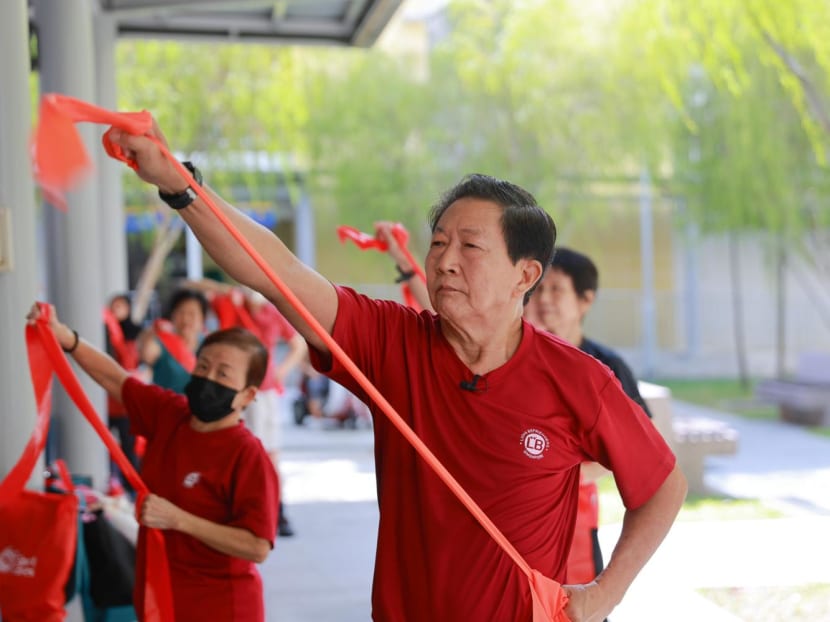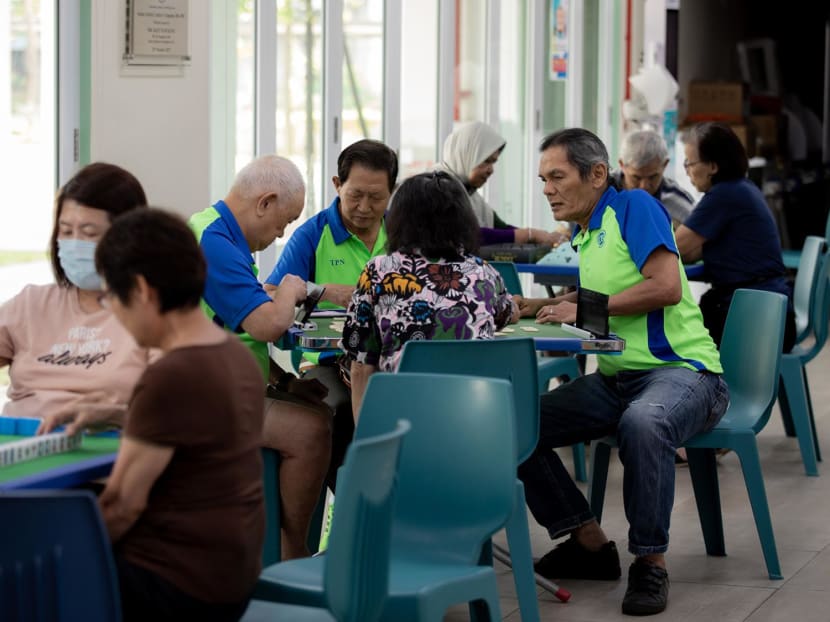Retired and lonely: It's tough to get men to take part in activities, say centres for elderly

Lonely seniors in Chinatown on Sept 20, 2023.
Follow us on Instagram and Tiktok, and join our Telegram channel for the latest updates.
- Voluntary welfare organisations said there is a significant disparity in the proportion of male seniors who participate in activities they organise, compared to their female peers
- Elderly males are also less likely to join in formal social activities, such as those organised at the active ageing centres or senior activity centres, compared to women
- This could be due to various reasons, such as the nature of activities possibly appealing more to women than men
- These older men likely focused more on their careers, so their social lives tend to take a hit when they stop working
- Experts and VWOs said programmes can be tailored to suit men's needs and interests, or by having activities outside of the centres’ formal settings

BY
DEBORAH LAU
Published September 24, 2023Updated September 24, 2023
WhatsAppTelegramFacebookTwitterEmailLinkedIn
SINGAPORE — For Mr Amayapan Kodanpan, who is single, the only social interactions he had were mostly with his siblings. That changed after his release from prison in June this year.
Prior to his incarceration for drug-related offences, the 74-year-old lived with his younger brother but lost contact with him when he moved homes while Mr Amayapan was in jail.
The retired odd jobs-worker also had two sisters but both died while he was serving jail terms for different offences. Although his sisters were married, he is currently estranged from their families.Today, Mr Amayapan lives alone in a rental unit in Chinatown with no next-of-kin. A friend’s daughter, whom he likens to a daughter of his own, visits fortnightly to help run errands and clean the house.
Mr Amayapan rarely speaks with his neighbours, apart from exchanging occasional greetings at their lift landing.
“They never talk to people, they keep to themselves. So I also do the same thing,” he said.
‘MORE CHALLENGING’ TO GET SENIOR MEN ENGAGED
Mr Amayapan’s situation is emblematic of a wider problem of male seniors who live in isolation and hardly socialise with others.ADVERTISEMENT
Voluntary welfare organisations (VWOs) that work with the elderly told TODAY they observe a significant disparity in the proportion of male seniors who participate in activities they organise, compared to their female peers.
Ms Karen Wee, executive director at Lions Befrienders, said that of the seniors they engage at their centres, around 80 to 85 per cent are women.
Similarly, Ms Kirsten Ong, head of two CareElderly active ageing centres (AACs) at Care Community Services Society, said only around 10 per cent of participants who attend their centre-based programmes are men.
Ms Ong added that they find it “more challenging” to get senior men engaged in organised activities, as some say they “don’t like structured programmes”.
Speaking at this year’s National Day Rally on Aug 20, Prime Minister Lee Hsien Loong highlighted how loneliness is one of the “biggest threats” to seniors’ well-being, and that it is important for the elderly to have a social network for mutual support.
To help seniors stay engaged and socially active, the Government has set up AACs across Singapore. An AAC is a drop-in social recreational centre that extends support to seniors living nearby in the community.Previous



Next
GENDERED, GENERATIONAL DIFFERENCES
Experts said that social isolation is a cause for concern regardless of gender and warned against framing it as an issue that plagues only elderly men.Nevertheless, they pointed to evidence from population surveys of older adults in Singapore which show that older men do report “higher levels of loneliness”.
Elderly males are also less likely to join in formal social activities, such as those organised at the AACs or senior activity centres, compared to women.
This could be due to various reasons – such as the nature of activities at AACs possibly appealing more to older women than men, or the cultural context of the times the elderly men lived in.
As the male seniors – who were typically the breadwinners of their family – retire, they find themselves losing a significant proportion of their community, as they may not maintain frequent contact with their ex-colleagues.
Though this is changing, Ms Wee of Lions Befrienders said that the social services and eldercare sector also tended to be “female-dominated” when it came to staffing, which could explain why its organised activities were “always more skewed towards females”.
Beyond this, she noted that this cohort of seniors were “born in a different generation” – with a “different psyche” and upbringing.
Agreeing, Dr Shannon Ang, an assistant professor of sociology at Nanyang Technological University, said: “Men and women living in such a time operated in quite clearly defined spaces and domains – for example, women in the home (and) men at the workplace.”
These older men likely focused more on their careers, and instead delegated social tasks such as remembering birthdays and organising extended family events to their wives – a practice which sociologists call “kin-keeping”.
Consequently, they may not have a great relationship with family members, while also maintaining few friends outside of work, Dr Ang added.
“Because such a big part of their identities and who they see regularly are linked to their jobs, their social lives tend to take a hit when they stop working,” he said.“Older women, on the other hand, are typically used to maintaining non-job-related social networks and do not typically face such a ‘shock’ later in life.”
This is something Ms Aveline Tan has also observed from her parents, who are both 64 years old this year.
The 28-year-old educator said that while her mother maintains regular contact with friends and ex-colleagues – talking to them on the phone or meeting them – her father “rarely meets up with others”, and his social circle consists primarily of their immediate family and his siblings.
“I’m sometimes worried because he spends most of his free time watching television, which I don’t think is very healthy. Sometimes I think he’s bored, but we might not have time to accompany him,” she said.
“I think it would be good for him to go out more often and meet more people to find new interests and talk to more people.”
Dr Ang said that the proportion of older men and women in an AAC does not “tell the full story”, because women statistically live longer than men. Regardless, it remains a cause for concern.
“Older men report having less social support than older women, which means that they may not have the help they need. Social connections are important for their health, and a lack of it may be part of the reason why they don’t survive as long as older women do,” he said.If left unaddressed, this phenomenon of elderly male isolation could also have ripple effects on the rest of society.
The knock-on effects of having seniors who do not enjoy good health include increased national health expenditure, said Associate Professor Carol Ma, head of gerontology programmes at the Singapore University of Social Sciences.
Society may also need more social workers, nurses, occupational therapists and doctors as a result.
“This will actually affect the whole of Singapore, so we need to really take action as soon as possible,” said Assoc Prof Ma.
TAILORING AACs TO SENIORS’ NEEDS
To this end, experts and VWOs said male seniors’ involvement in the community could be encouraged either through tailoring more AAC programmes to suit their needs and interests, empowering seniors to take charge of the programmes, or by decentralising the AACs and meeting the men where they are – even if this means taking the activities outside of the centres’ formal settings.Ms Ong from Care Community Services Society said that the organisation actively gets feedback from male seniors in the community, then tailors its activities to suit the elderly’s preferences and needs.
“Through this, more diverse activities can be offered to cater to a range of interests, including those typically associated with male hobbies or pastimes,” she added.
Ms Wee of Lions Befrienders said they have been getting more male seniors to step up as peer leaders and facilitate programmes.
Dr Ang added: “We can build and create more inclusive social spaces – what are sometimes called ‘third places’ – that are more suited to the needs and wants of older men. These need not be a centralised location like an AAC or a community centre where programmes occur.
“It can be achieved simply by making small modifications to existing spaces such as the hawker centre, the void deck, (or) the bicycle shop, to make it more conducive for older persons – not just men – to hang out over a shared activity, or to pursue solo activities in the midst of others.”
Agreeing, Assoc Prof Ma said: “They don’t need to go to AAC because we want the AAC to go to them. We can set up AAC in the hawker centre, we can set up AAC in their community, we get them involved (and) become part of the AAC.”
The elderly men who do take part in the AAC’s programmes attest to the benefits of joining the activities.
Mr Tan Yew King, a 68-year-old retiree, has been visiting a Lions Befrienders AAC in Tampines for two years now. He visits the centre four times a week and spends about an hour there each time.
Speaking to TODAY in Mandarin, he said that he could not participate in such community activities when he was still working, as he would be tired from working 12-hour days as a security officer.
“It’s great to have initiatives like this. Otherwise, the elderly might overthink while sitting at home,” said Mr Tan, whose wife has also joined him to attend the centre’s activities.
“I feel happier joining these programmes. I get to know more friends, and I feel livelier as a result.”
TODAY has reached out to the Agency for Integrated Care for comment.






